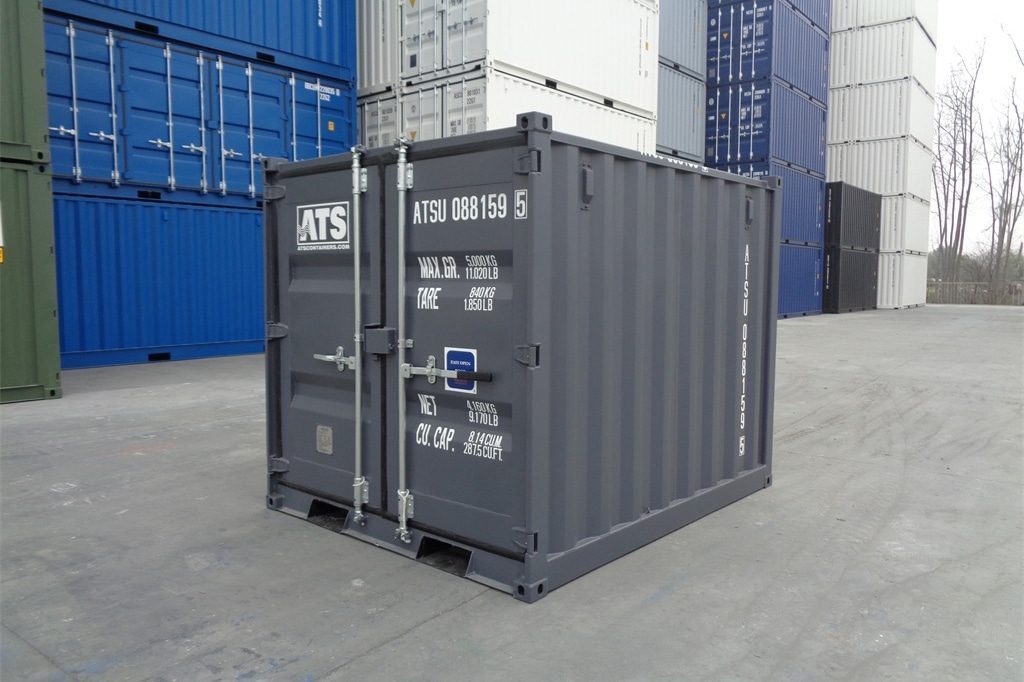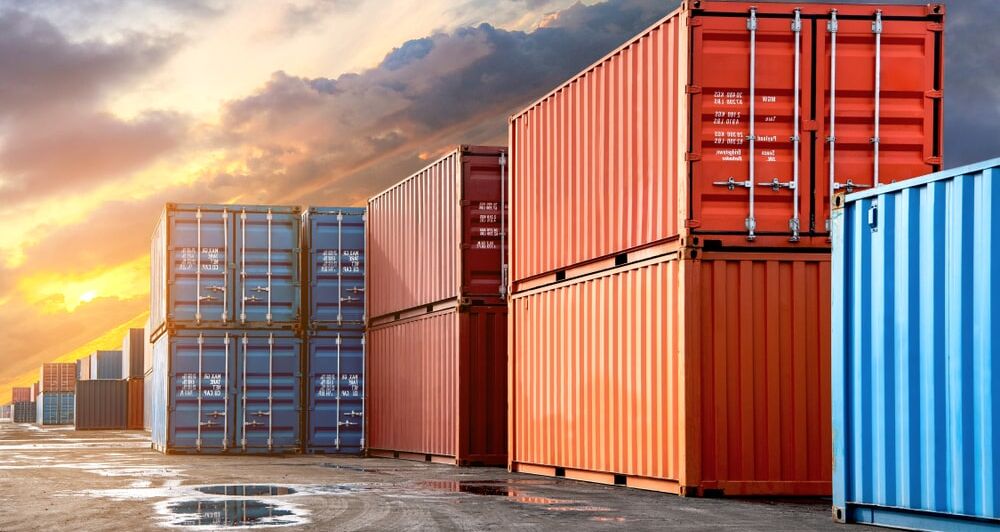Whatever You Need to Find Out About Shipping Containers and Their Practical Applications
Shipping containers have developed from plain devices for transportation to versatile structures with numerous useful applications. Their durable design and standard sizing make them optimal for a series of uses beyond shipping. From cutting-edge housing solutions to lasting farming, their adaptability is noteworthy. Yet, the possibilities do not end there. Discovering their various features exposes shocking insights right into contemporary challenges and innovative remedies. What other functions could these containers play in today's globe?
The Layout and Framework of Shipping Containers

Inside, containers are made to make best use of space, often featuring wooden or steel floor covering that can sustain substantial weight. Air flow systems might be integrated to avoid moisture accumulation, which is critical for delicate freight. In addition, reinforced corners enable for easy handling by cranes and forklifts, promoting smooth loading and unloading. This thoughtful style and framework add to the containers' flexibility throughout numerous shipping and storage applications.
Benefits of Making Use Of Shipping Containers
While many transportation methods have their benefits, the use of shipping containers stands apart as a result of their unparalleled convenience and efficiency. Shipping containers use a standard dimension, making them simple to stack and transport across numerous settings of transport, consisting of ships, trains, and trucks. This standardization minimizes packing and discharging times, consequently enhancing general productivity.
Shipping containers are constructed from durable materials, giving robust security for items during transportation. They are weather-resistant and safe, minimizing the risk of damages from environmental variables or burglary. Additionally, the modular design of shipping containers permits easy personalization, allowing companies to adapt them for different objectives, such as storage space or mobile offices.
Their mobility and cost-effectiveness make shipping containers an appealing choice for companies looking to improve logistics and supply chain operations. These benefits add to the growing popularity of shipping containers in various industries.
Imaginative Housing Solutions With Shipping Containers
Innovative housing solutions have actually arised as an exciting application of delivery containers, leveraging their fundamental toughness for household usage. These versatile structures supply a sustainable alternative to conventional structure materials, frequently at a fraction of the expense. Designers and developers have actually transformed containers into fashionable, functional homes, catering to varied way of lives and choices.

In addition, shipping containers are eco-friendly, advertising recycling and reducing waste. Several jobs focus on energy efficiency, including eco-friendly roofings and solar panels. As urbanization increases, these innovative housing solutions offer a practical feedback to housing shortages while fostering an one-of-a-kind building visual.
Shipping Containers in Retail and Pop-Up Shops
A growing number of merchants are turning to shipping containers as a vibrant service for pop-up stores and retail areas. These functional structures provide an economical option to typical shops, permitting companies to create special, distinctive atmospheres that bring in clients. Their modular layout allows simple transportation and setup, making them optimal for temporary or seasonal retail places.
Retailers can customize shipping containers to reflect their brand identification, changing them into visually appealing stores that attract attention in jampacked markets. The compact nature of containers also urges effective use space, enabling imaginative designs that enhance customer circulation and involvement. Shipping containers can be located in non-traditional locations, such as city parks or vacant lots, increasing access and foot website traffic.

As the retail landscape develops, delivering containers give a innovative and versatile option that fulfills the demands of modern customers while enhancing the purchasing experience.
Sustainable Farming Practices Using Shipping Containers
Lasting farming methods progressively incorporate delivery containers as cutting-edge services for farming - shipping container storage. These container farms use hydroponics to maximize area pop over to this web-site and resource performance, supplying an affordable approach to food production. By changing shipping containers right into farming hubs, farmers can attend to food safety and security and ecological concerns at the same time
Container Farming Perks
While conventional farming encounters challenges such as land scarcity and climate change, container farming offers a viable choice that makes best use of space and sources. This innovative approach enables for year-round plant production in regulated atmospheres, reducing dependence on weather conditions. Container ranches use less water than traditional farming, promoting sustainability and preservation. They can be developed in city areas, bringing fresh fruit and vegetables closer to customers and reducing transport discharges. Furthermore, the modular nature of shipping containers allows scalability, permitting farmers to change procedures based on need. Container farming also decreases pesticide use by developing an enclosed environment, eventually boosting food safety and security. As metropolitan populations grow, container farming arises as a practical option to satisfy the increasing need for regional, lasting food resources.
Hydroponics in Containers
Hydroponics, which enables plants to expand without dirt by using nutrient-rich water, grows within the boundaries of shipping containers, making it an optimal approach for metropolitan farming. These containers create a regulated setting that enhances moisture, temperature, and light, making it possible for year-round growing. With limited space in city locations, delivering containers use a scalable service for expanding fresh produce. Hydroponic systems within containers can include numerous techniques, such as nutrient film technique (NFT) and deep water culture (DWC), which make best use of return while minimizing water use. This cutting-edge strategy not just enhances food safety and security however also lowers the carbon footprint associated with conventional farming methods. Hydroponics in containers stands for a forward-thinking option for lasting urban food production.
Affordable Farming Solutions
As food production deals with enhancing obstacles because of environment modification and urbanization, shipping containers arise as an affordable option for farming. These versatile structures can be repurposed for various lasting farming methods, such as hydroponics and upright farming. By making use of controlled atmospheres within containers, farmers can enhance development cycles and lower source intake, including water and fertilizers. In addition, delivering containers can be tactically put in metropolitan areas, lessening transport expenses and enhancing access to fresh fruit and vegetables. Their modular nature permits scalability, making it possible for farmers to increase procedures as demand grows. Repurposing containers contributes to squander decrease, straightening with green farming initiatives. On the whole, shipping containers existing innovative opportunities for sustainable and effective food manufacturing.
Emergency Situation and Disaster Alleviation Applications of Shipping Containers

Organizations frequently make use of delivery containers to produce mobile clinics or field healthcare facilities, guaranteeing that treatment reaches those in need. Additionally, they can be transformed right into command centers for collaborating rescue procedures, therefore enhancing organizational efficiency during situations.
Containers can be modified to save essential products such as food, clothes, and water, protecting products up until they are distributed. Their mobility allows them to be easily carried to various places, making certain that aid shows up where it is most urgently needed. Overall, shipping containers play a critical duty in boosting the efficiency of catastrophe alleviation efforts worldwide.
Frequently Asked Concerns
Exactly How Are Shipping Containers Transported From One Place to Another?
Shipping containers are transferred using ships, trucks, and trains, using cranes for filling and unloading. This multi-modal transportation system makes sure effective activity throughout land and sea, connecting global supply chains and assisting in global profession.
What Is the Typical Lifespan of a Delivery Container?
The average life expectancy of a shipping container usually ranges from 10 to 25 years, depending upon maintenance, use, and environmental elements. Appropriate treatment can prolong their functionality, while forget may cause degeneration and damage.
Can Shipping Containers Be Changed for Various Usages?
Yes, shipping containers can be modified for different usages. They work as homes, offices, pop-up shops, and storage devices. Their convenience enables creative adaptations, making them appropriate for a wide variety of applications.
Are Shipping Containers Eco Friendly?
Shipping containers can be eco pleasant, as they promote repurposing and recycling. Their toughness decreases waste, while their use in alternate real estate and companies minimizes the requirement for new products, adding to lasting practices.
How Do I Pick the Right Dimension Shipping Container?
To select the right size delivery container, one have to examine storage needs, consider the designated usage, and examine space schedule - shipping containers for sale near me. Common sizes consist of 40-foot and 20-foot containers, each serving different storage and transportation demands effectively
Cutting-edge housing remedies have arised as an interesting application of shipping containers, leveraging their inherent staminas for residential usage. The adaptability of shipping containers enables for creative layouts, from single-unit dwellings to complicated multi-container arrangements. Sustainable farming techniques increasingly incorporate delivery containers as innovative options for agriculture. Furthermore, the modular nature of shipping containers allows scalability, allowing farmers to readjust operations based on demand. Hydroponics, which enables browse around this web-site plants to expand without soil by utilizing nutrient-rich water, prospers within the confines of shipping containers, making it an optimal technique for metropolitan agriculture.